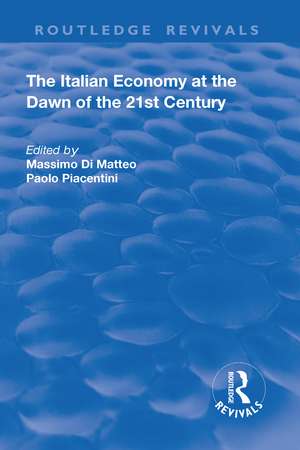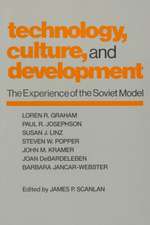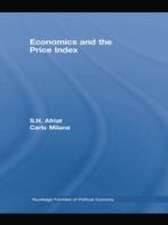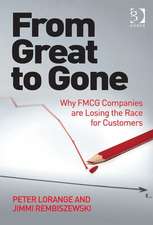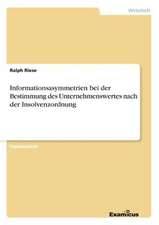The Italian Economy at the Dawn of the 21st Century: Routledge Revivals
Editat de Massimo Di Matteo, Paolo Piacentinien Limba Engleză Hardback – 14 dec 2017
| Toate formatele și edițiile | Preț | Express |
|---|---|---|
| Paperback (1) | 221.07 lei 6-8 săpt. | |
| Taylor & Francis – 11 noi 2019 | 221.07 lei 6-8 săpt. | |
| Hardback (1) | 680.73 lei 6-8 săpt. | |
| Taylor & Francis – 14 dec 2017 | 680.73 lei 6-8 săpt. |
Din seria Routledge Revivals
- 9%
 Preț: 801.71 lei
Preț: 801.71 lei - 8%
 Preț: 432.64 lei
Preț: 432.64 lei -
 Preț: 168.89 lei
Preț: 168.89 lei -
 Preț: 245.88 lei
Preț: 245.88 lei -
 Preț: 309.79 lei
Preț: 309.79 lei -
 Preț: 258.73 lei
Preț: 258.73 lei - 9%
 Preț: 764.35 lei
Preț: 764.35 lei - 9%
 Preț: 903.42 lei
Preț: 903.42 lei -
 Preț: 311.18 lei
Preț: 311.18 lei -
 Preț: 357.45 lei
Preț: 357.45 lei - 9%
 Preț: 626.93 lei
Preț: 626.93 lei -
 Preț: 317.54 lei
Preț: 317.54 lei - 9%
 Preț: 764.30 lei
Preț: 764.30 lei -
 Preț: 257.01 lei
Preț: 257.01 lei -
 Preț: 238.40 lei
Preț: 238.40 lei -
 Preț: 259.48 lei
Preț: 259.48 lei - 9%
 Preț: 938.10 lei
Preț: 938.10 lei -
 Preț: 341.33 lei
Preț: 341.33 lei -
 Preț: 264.10 lei
Preț: 264.10 lei -
 Preț: 294.98 lei
Preț: 294.98 lei -
 Preț: 308.89 lei
Preț: 308.89 lei -
 Preț: 207.40 lei
Preț: 207.40 lei -
 Preț: 347.50 lei
Preț: 347.50 lei -
 Preț: 302.59 lei
Preț: 302.59 lei -
 Preț: 389.40 lei
Preț: 389.40 lei -
 Preț: 257.01 lei
Preț: 257.01 lei -
 Preț: 358.30 lei
Preț: 358.30 lei - 9%
 Preț: 640.91 lei
Preț: 640.91 lei - 9%
 Preț: 619.49 lei
Preț: 619.49 lei -
 Preț: 228.88 lei
Preț: 228.88 lei -
 Preț: 265.16 lei
Preț: 265.16 lei -
 Preț: 257.90 lei
Preț: 257.90 lei -
 Preț: 266.06 lei
Preț: 266.06 lei -
 Preț: 258.73 lei
Preț: 258.73 lei -
 Preț: 384.01 lei
Preț: 384.01 lei -
 Preț: 246.38 lei
Preț: 246.38 lei - 9%
 Preț: 832.08 lei
Preț: 832.08 lei -
 Preț: 266.20 lei
Preț: 266.20 lei -
 Preț: 294.53 lei
Preț: 294.53 lei - 18%
 Preț: 695.86 lei
Preț: 695.86 lei - 9%
 Preț: 934.96 lei
Preț: 934.96 lei - 5%
 Preț: 243.38 lei
Preț: 243.38 lei -
 Preț: 274.69 lei
Preț: 274.69 lei -
 Preț: 208.20 lei
Preț: 208.20 lei - 9%
 Preț: 659.19 lei
Preț: 659.19 lei -
 Preț: 259.69 lei
Preț: 259.69 lei - 9%
 Preț: 1038.47 lei
Preț: 1038.47 lei -
 Preț: 389.46 lei
Preț: 389.46 lei -
 Preț: 302.14 lei
Preț: 302.14 lei -
 Preț: 302.27 lei
Preț: 302.27 lei
Preț: 680.73 lei
Preț vechi: 989.74 lei
-31% Nou
Puncte Express: 1021
Preț estimativ în valută:
130.26€ • 141.93$ • 109.76£
130.26€ • 141.93$ • 109.76£
Carte tipărită la comandă
Livrare economică 23 aprilie-07 mai
Preluare comenzi: 021 569.72.76
Specificații
ISBN-13: 9781138714557
ISBN-10: 1138714550
Pagini: 378
Dimensiuni: 152 x 229 mm
Greutate: 0.45 kg
Ediția:1
Editura: Taylor & Francis
Colecția Routledge
Seria Routledge Revivals
Locul publicării:Oxford, United Kingdom
ISBN-10: 1138714550
Pagini: 378
Dimensiuni: 152 x 229 mm
Greutate: 0.45 kg
Ediția:1
Editura: Taylor & Francis
Colecția Routledge
Seria Routledge Revivals
Locul publicării:Oxford, United Kingdom
Notă biografică
Massimo Di Matteo, Paolo Piacentini
Cuprins
I: Growth Patterns and Structural Features; 1: Italy’s First Phase of Postwar Development: The Role of Aggregate Demand 1; 2: The Italian Economy after the Bretton Woods Era (1971–2001); 3: The Italian Labour Market and Production System: Structural Features and Main Developments; II: Aspects of a Dual Economy; 4: Old and New Dualisms in the Italian Labour Market; 5: Development Policies in the Italian Mezzogiorno: Lessons from the Past; 6: Rethinking Development Policies in Italy 1; 7: Evolution of Production Structure in the Italian Regions; III: Corporate Governance and Industrial Organization; 8: Continuity and Change in Italian Corporate Governance: The Institutional Stability of One Variety of Capitalism; 9: Production Outsourcing in Italian Manufacturing Industry 1; 10: Italian Districts in the International Economy; 11: Banking System and the Dualistic Development of the Italian Economy; IV: Social Institutions and Networks; 12: The Fiscal Decentralization and the Autonomy of the Local Government; 13: The Italian Third Sector: An Overview at the Beginning of the Century; 14: The Family and Social Networks in the Socio-Economic Development of Italy; 15: The Italian Welfare System Between the European Unification and the Globalization Processes: A Suggested Interpretation
Descriere
This title was first published in 2003. Most of the essays collected in this volume are the revised versions of the reports presented at a conference held at the University of Tokyo in October 2001, organised as part of the initiatives of the "Italian Year" in Japan, and supported by the Foundation Italy in Japan 2001, the Italian Chamber of Commerce in Tokyo, the Italian Ministries of Foreign Affairs and of Higher Education, and the University of Tokyo. The essays, which aim at a fact-based presentation, provide a thorough survey of the relevant problems and aspects of present-day Italian economy and society. Those peculiar features of the Italian economy, such as its dualistic industrial structure and territorial divide, are analysed at length, with an eye to open policy options. The economic analyses are complemented by presentations of some of the central topics on the Italian social framework, such as the role of family and the "Third Sector".
